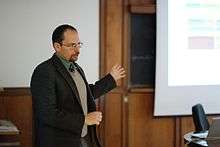Jonathan Lunine
| Jonathan Lunine | |
|---|---|
 | |
| Born |
Jonathan Irving Lunine June 26, 1959 (age 57) Manhattan, New York City, New York |
| Occupation | Planetary Scientist, Physicist |
| Awards | Harold C. Urey Prize (1988) |
Jonathan I. Lunine (born June 26, 1959) is an American planetary scientist and physicist. Lunine teaches at Cornell University, where he is the David C. Duncan Professor in the Physical Sciences and Director of the Center for Radiophysics and Space Research. Having published more than 200 research papers, Lunine is at the forefront of research into planet formation, evolution, and habitability. His work includes analysis of brown dwarfs, gas giants, and planetary satellites. Within the Solar System, bodies with potential organic chemistry and prebiotic conditions, particularly Saturn's moon Titan, have been the focus of Lunine's research.[1]
He is the David Baltimore Distinguished Visiting Scientist at NASA’s Jet Propulsion Laboratory. He is an interdisciplinary scientist on the Cassini mission to Saturn, and on the James Webb Space Telescope, as well as co-investigator on the Juno mission launched in 2011 to Jupiter. He is a member of the U.S. National Academy of Sciences,[2] a fellow of the American Association for the Advancement of Science and the American Geophysical Union, and a member of the International Academy of Astronautics, which gave him its Basic Science Award in 2009. In 2015 he was awarded the Jean Dominique Cassini medal of the European Geosciences Union. He earned a B.S. in Physics and Astronomy from the University of Rochester in 1980, followed by M.S. (1983) and Ph.D. (1985) degrees in Planetary Science from the California Institute of Technology.[3]
Selected publications
Technical books
- Earth: Evolution of a Habitable World, 2nd Edition (Cambridge University Press, 2013)
- Astrobiology: A Multidisciplinary Approach (Pearson Addison-Wesley, 2005)
References
- ↑ "Jonathan I. Lunine". 50 Years in Space. California Institute of Technology. July 2007. Retrieved 2007-09-01.
- ↑ News of being elected as a member of National Academy of Sciences
- ↑ "Dr. Jonathan I. Lunine". Department of Planetary Sciences Lunar and Planetary Observatory, Faculty. University of Arizona. May 2002. Archived from the original on 2007-08-23. Retrieved 2007-09-01.